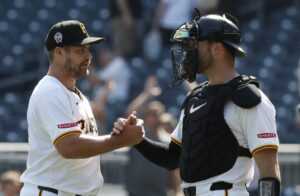The “opener” starts the “bullpen game.” Baseball purists, longing for the return of Tom Seaver’s complete-game pitching dominance, wince at both terms. However, it’s here to stay in MLB because it works. Therefore, how about a games opened stat?
The Tampa Bay Rays developed the concept of the opener and perfected it. The Rays opened their game on April 23rd with two hitless innings by J.P. Feyereisen. Five relievers later, they closed nine hitless innings against the Boston Red Sox before winning 3–2 in ten innings.
Yes, the opener starts. However, the opener is not a starting pitcher even if he throws the first pitch of the game.
Good-bye Spot Starter and Long Man
The bullpen game with its’ opener and the ensuing parade of relief pitchers has replaced the spot starter. The traditional spot starter and his cousin the “long man” in the bullpen don’t really exist anymore. Long men don’t stick around games that long these days. For instance, Moe Drabowsky pitched 6 2/3 scoreless innings as a long man to close Game One of the 1966 World Series. Picking up that Game One win was the greatest day of his 17-year career. However, in 2022, Drabowsky would have been lifted long before the seventh-inning stretch.
A wily veteran or an unproven player typically filled this role. For instance, Nolan Ryan excelled in this role with the 1969 New York Mets as an unheralded 22-year-old. His 25 appearances that season included ten starts and he won the NLCS clincher by pitching seven innings in relief. A generation later, Ramiro Mendoza excelled in a similar role for the championship New York Yankees teams. Also, marathon games of 20 innings or more always included long men in the pen who earned their pay that day. A young Gaylord Perry secured his spot on the San Francisco Giants by pitching ten scoreless innings in relief in a 23 inning victory over the Mets in 1964.
In 2022, a pitcher who throws ten innings in relief is as necessary as a spare tire on a rowboat. Currently, the spot starter is often a pitcher on the shuttle between Triple-A and the majors. For example, the Mets rewarded David Peterson for an effective start on April 22 with a prompt return ticket to Triple-A Syracuse. He’ll return in early May for another spot start.
Games Opened Statistic
By design, the opener is a reliever who starts a game with no intention of seeing the opposing lineup a second time. One can’t argue with this successful tactic if specialization works. However, let’s add a little specialization to the stat sheet to reflect this specialization of strategy. Instead of crediting the opener with a game started (GS), let’s call it a call a “game opened” (GO). It would recognize the unique role of the opener versus a traditional starting pitcher whose intention is to pitch deep into the game. This GO designation may result in certain pitchers earning a cache as an opener much like closers have. Perhaps, the best opener might even open the All-Star Game in the future?
Whether a pitcher gets credited with a start or an open would need to be determined by managerial intent. Also, an opener couldn’t pitch beyond two or three innings. For cases where managerial intent isn’t clear, the official scorer should deliver the verdict. The official scorer already has the power to deny a win to a relief pitcher whose outing was “brief and ineffective” so distinguishing a start from an open wouldn’t be such a radical move. In fact, the Mets’ 5–2 loss to the Arizona Diamondbacks on April 23rd might have presented such a quandary. Trevor Williams started for the Mets but failed to retire a batter in the third inning. He wasn’t expected to go deep into the game; however, was his outing cut short by a preordained innings pitch or ineffectiveness?
Baseball statistics evolve with the game. For example, the save didn’t become an official statistic until 1969. Besides, if games finished (GF) is an official statistic, why not games opened?
Main Photo:
Embed from Getty Images
Players Mentioned:
Tom Seaver, Moe Drabowsky, Nolan Ryan, Ramiro Mendoza, Gaylord Perry, David Peterson, Trevor Williams, J.P. Feyereisen






